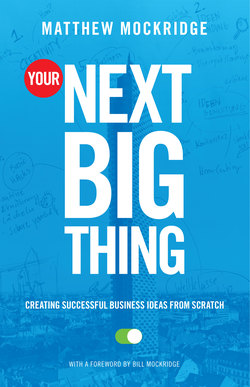Читать книгу Your Next Big Thing - Matthew Mockridge - Страница 20
На сайте Литреса книга снята с продажи.
Оглавление[no image in epub file]
Offense Instead of Defense
We are on the road a lot. I live and work in countless cities—both because of our events and my work as a speaker—but my home base for the moment is Cologne. Actually, not the city, but a small village fifteen minutes outside of town! It is surrounded by forests and lakes yet close enough to the city not to feel completely excluded. This location was chosen deliberately: the rent is much cheaper than in the city, I like to go for walks by the lake, and there is plenty of parking. But above all, I always play offense out here—in the city, you often only play defense. Everyone wants something from you, so they invite you to lunch, to coffee meetings, to drinks in the evening—your productivity often falls victim to the city. But my village location allows me to make the rules: I invite people to come to me if I want that, I have peace of mind, and I live according to my own schedule instead of the city’s schedule, with its the rush hour and the crowds. I’m proactive and not reactive—a productivity strategy that allows me to do a lot more and be much more relaxed.
Find a location that positions you on offense, not on defense—then you’ll score!
[no image in epub file]
8. The Creative Brain and Your Biceps
The brain, like a muscle, is trainable. I like fitness. I go to the gym, pay attention to my diet, own expensive workout equipment, follow good exercise routines, and take food supplements. I have really made fitness a part of my way of life. Why? It provides a good balance. I start the day off right with a good workout and a healthy breakfast, both which cause the “I feel really good” neurotransmitters—like endorphin, dopamine, and serotonin—to get released into the body. It also results in a good physique—a nice side effect.
The killer: you can do exactly the same thing with your brain! Proof? The ability to orient oneself is located in the prefrontal cortex, which covers the frontal lobe of the brain. London taxi drivers have to deal with a super complex road network. Scientists have found that parts of their prefrontal cortex are much larger than those of other people. The continuous engagement with their work has led to actual brain growth—just like physical exercise leads to muscle development! It’s like a ripped six-pack stomach, but in the head! The ability for the brain to change is called neuroplasticity. So, can we apply the lessons of the gym to developing our thinking, learning processes, and our continuing education? Can we consciously train our brains, especially the part responsible for creativity? Yes!
